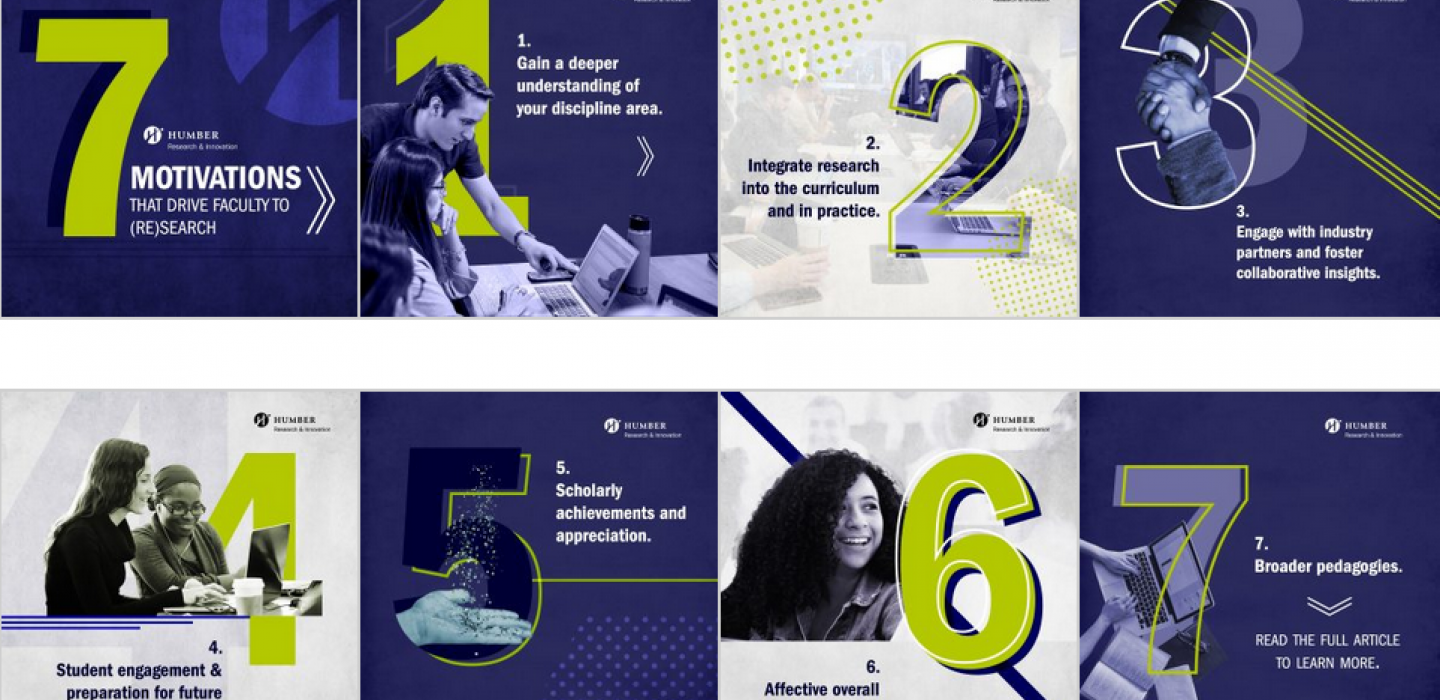As per the Merriam-Webster Online Dictionary, the word research is derived from the Middle French “recherche”, which means “to go about seeking”, the term itself being derived from the Old French term “recerchier” a compound word from “re-” + “cerchier”, or “sercher”, meaning ‘search’. The earliest recorded use of the term was in 1577.
Professors and teachers are busy enough managing program loads and academic responsibilities. Why do they, despite the pressures, challenge themselves to conduct research, and how does research help them become better practitioners?
Nurturing a research-based approach to teaching and learning has helped educators embed scientific and analytical thinking in educational practices. Research has allowed faculty to direct the findings in a way that optimizes best outcomes for academic institutions, industry partners, and communities at large.
At Humber, we especially encourage experiential learning and support the process of knowledge-creation through discovery and innovation. Faculty members and our distinguished researchers are a vital component in this endeavour.
BENEFITS AS A FACULTY RESEARCHER:
1. Gain a deeper understanding of your discipline area.
It can provide a deep sense of satisfaction to know that you contribute valuable new knowledge and understanding to your field of expertise through insights and revelations uncovered during research. Research is an ideal way to explore further, address creative queries that arise, say in a classroom, and gain a deeper understanding of an academic discipline.
2. Integrate research into the curriculum and in practice.
Research findings make the process of teaching and learning more current and up-to-date. It sets students apart and allows them to participate in a learning experience based on realistic challenges incorporated into their programs. Addressing real-world challenges may unearth gaps in the curriculum, and program objectives could be addressed to prepare for the skills required and market demands. Students better understand the significance of effective teamwork in and out of the classroom.
3. Engagement with industry partners and foster collaborative insights.
Working with industry partners is mutually beneficial. External stakeholders seek to connect with academic research expertise and faculty excellence to create and test new trends and technologies for a better competitive edge; simultaneously, faculty and students are presented with an excellent opportunity to collaborate with industry resources, tools and know-how. Such partnerships promote and expand the mobilization and transfer of knowledge to the broader community.
4. Student engagement and helping prepare them for future careers and employment opportunities.
Participating in research programs builds critical thinking skills, and as mentors to a generation of future leaders, we owe it to them. Real-life and immersive experiences, gained through research projects, assist in training students to set achievable goals and systematically attain desired outcomes. Getting involved on a practical level helps engage students inside the classroom while also offering them exciting and rewarding employment opportunities outside the classroom.
5. Scholarly achievements and appreciation.
Research accomplishments, achievements and recognitions are often commended and appreciated through opportunities to get published in renowned journals and publications. A research project could have the potential to have a much more significant impact long-term. Research prizes and awards, getting credit for a research discovery or invention, patents, copyrighted material, software development, and emergent technologies; the list goes on. It is a sure path to improve your own and your organization’s practices and credentials.
6. Affective overall outcomes.
Working alongside researchers has gained popularity with students, as they find that engaging in research activities is a rewarding experience. Students project overall satisfaction in their educational journeys and they are equipped with enhanced skills and an ability to develop intellectual curiosity and an analytical mindset. Students involved in research often get motivated to pursue advanced/graduate studies, digging deeper to unearth new knowledge.
7. Broader pedagogies.
Student and learning outcomes are now more wide-ranging than ever before. Researchers address this need for a novel demand in broadening pedagogies, innovating teaching practices by injecting creativity with an aim to provide maximum benefit to students and learners. Participating in research can promote significant knowledge gain.
What do you love most about conducting research? How has it impacted you and your students’ abilities? Do you induce and encourage a childlike love for discovery while working on a project?
“If we knew what it was we were doing, it would not be called research, would it?”
– Albert Einstein
